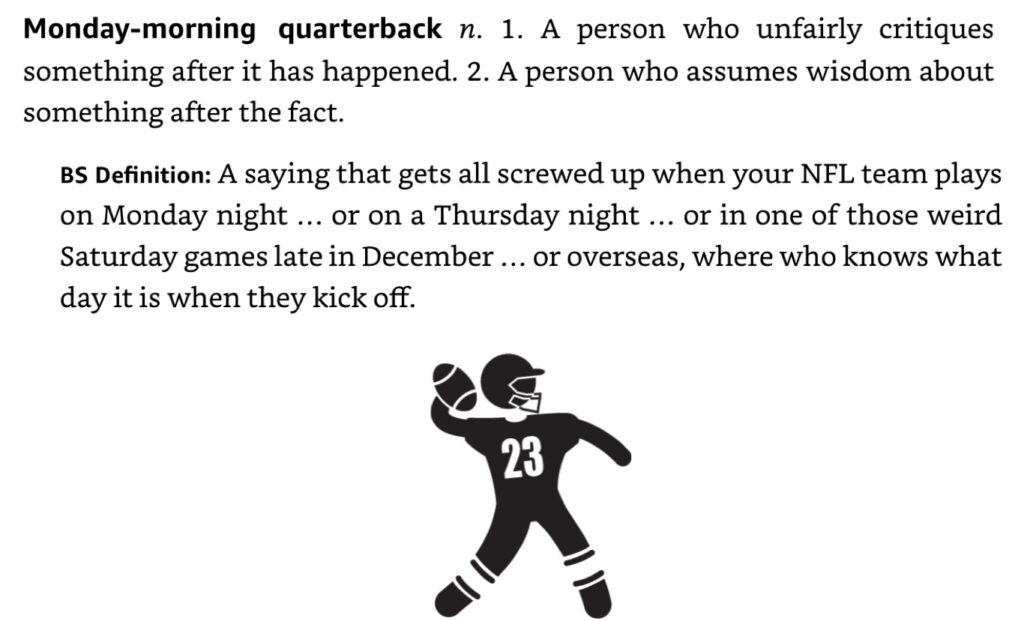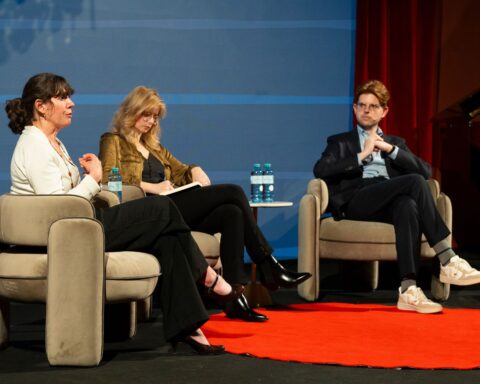Do you need an “actionable” guide for “hands-down” success in conversing with the “heavy hitters” of the Fortune 500? Or does your boss keep “pinging” you on your holiday telling you that you need to keep “blue-skying” your “elevator pitch” for the new project in time for the next “all-hands meeting” so they can “leverage” the current budgetary “wiggle room” before finance “nips it in the bud”?
If this makes any sense to you, you might be familiar with the world of business and its very own language. In recent years, business speak has taken over in many offices, even becoming more common globally with an increase in work-from-home environments and remote work. Still, to those who are strangers to the corporate environment or newcomers to the business world, it can be questionable and confusing. You might quite rightly feel “in the weeds”.
Bob Wiltfong, author, award-winning journalist, and former correspondent on “The Daily Show with Jon Stewart”, has made it his mission to guide you through this wordy wilderness of business terms and phrases, and make it fun. Together with Tim Ito, Wiltfong wrote the Amazon bestseller “The BS Dictionary: Uncovering the Origins and True Meanings of Business Speak”, the result of a long-standing interest in the idioms and vocabulary that make the language of business.
At the 2022 TEDxVienna conference, he went beneath the surface to expose the BS of business speak and shared unique insights on the corporate world. In this behind-the-scenes interview, Wiltfong goes into detail on his favorite BS terms, the power of communication, and the future of business speak.
As a public speaking consultant, we can consider you an expert in the field. Were you nervous before your talk at all?
My fellow speakers were asking me that same question, saying: “You weren’t nervous out there, were you?”. The reality is that I was nervous. There is a saying that you get nervous when you care and I wanted to do a good job and make a good impression.
There are things I’ve learned over the years of failing miserably at public speaking and then teaching people how to overcome their nerves that I applied today that helped me a lot tough. One is that I locked myself in a dressing room for about an hour before taking the stage and just said my presentation out loud over and over again for the repetition. The other thing, right before I went on stage, is that I really concentrated on breathing, just taking deep breaths, to relax myself.
Why do you think business speak has become so common and ingrained in our language?

I don’t know for sure. From my work as a consultant – I work with companies around the world in different industries – I’ve experienced an increase in business speak over the last ten years, but that is solely an anecdotal observation.
I was talking with an audience participant at one of the breaks here and he had a theory as to why BS is becoming more common. He pointed out that English is a second language for many people and that there is more and more global business being made right now. With business speak there are common phrases that, regardless of your original language, we can all come back to and find a common understanding. Maybe that is why it feels like it’s more prevalent than it has ever been.
Also, as human beings, we latch on to certain words. There’s a reason why slang words become popular and somewhat take over. During the pandemic, business speak terms like “pivot” and “new normal” became more commonly used. I don’t know if it’s just human psychology, people like those words, and we find ourselves drawn to them, but I don’t know exactly why that is.
Business speak has come over to Austria as well, with words like “win-win”, “fake news”, and “ghosting”. There is no real German-language equivalent, you would just say it in English.
The flip of that from the German language is “zeitgeist”. That’s a big BS word that has no English-language equivalent. “Kaput”, “schadenfreude”, and “uber” also get some play in the language of English business speak. So it goes both ways.
You’ve told us today on stage already, but for our readers, what is your favorite and least favorite BS word and why?
My least favorite word, the first word that comes to mind here, is “synergy”. I really dislike “synergy.” I think part of the reason why it bugs me so much is because it feels inauthentic to me. I think it’s overused in business speak to the point of being cliché.
One of my general guidelines for whether any word is more BS than it is productive communication is asking myself, “Would I say this word to my wife in regular conversation?”. Would I say to my wife, “Honey, I don’t feel connected to you recently. I want more synergy between us”? I don’t think I would. She’d probably look at me like, “What the hell are you saying?”. So “synergy” is top of my list of least favorite BS words.

Now, as far as my favorite BS terms go? I love the BS word “boondoggle” which is an activity that looks like it has value but is really a complete waste of time and money. I love that word not only because it’s a fun word to say – “boondoggle” – but also because its origin story is really strange. We detail it in the book. I also like “dogfooding” because at the heart of it is such a horrible way to view your own employees – like they’re dogs that you’re feeding experimental food that may or may not be good for them. And the phrase “stealing one’s thunder” is also a personal favorite because, again, the origin story behind it is so interesting and funny to me.
I should also point out, I’m a big sports fan, and in writing a book about business speak, I’ve become much more sensitive to how sports-centric my communication is. When in doubt, my instinct is to communicate with sports analogies or phrases. I don’t know if I actually like the words I’m saying, but I do use them a lot.
For example, “Monday-morning quarterback” is a phrase in the BS world I use that is football-related. “Hitting a home run” and “pinch hitting” are baseball terms. I find myself saying those a fair amount, too.

You mentioned some difficult topics in your talk regarding business speak, like exclusion and upholding certain power structures in the workplace. What is the biggest problem that you see with the use of business speak?
One of the three headline takeaways of my presentation is the idea that BS is the language of the elite and that it is primarily white men who lead the business world even today. I said on the stage there’s research that shows that about 90% of today’s CEOs of Fortune 500 companies around the globe are white men. Hopefully, that will change.
That reality influences a lot of the language that we use on the job and the culture that we have in workplaces. I hope as a society we are becoming more sensitive and aware of that. There are some women and non-white minorities who don’t feel as welcome in boardrooms as a result. If you aren’t into sports but you’re hanging around with the board of directors who all like sports and are all old white guys, it’s going to be hard to feel comfortable.
That is something that I really wanted to drive home to people, make them pause, and think about the words that they choose – because these words do have an impact, especially over time. When my wife, who is the Chief Marketing Officer of a company, is the only woman in the “C-Suite”, that’s also a BS term, there is something inherently odd about that. I want her and every person to feel as comfortable at work as they feel anywhere else.

Can BS be saved? Do you think there is a way for people working in business to use business speak for inclusion rather than exclusion, or must we rise above it entirely?
I think there is major value in some of the business speak. I only had fifteen minutes to talk, so there were some nuances, some points that I couldn’t fully get into. I did talk to some audience members during the break earlier about this concept. There is value in some of these business speak terms because they allow for efficiency in communicating a thought. To people of the same background, same age, or occupation there is a helpful short-hand, for example, “EBITDA”.
I don’t want to send the message that this is all a bunch of BS and that we must get rid of it. It’s just about being sensitive to and aware of our use of it.
If you’re going to use your words to try to corral people into a corner or away from you, that’s a bad thing to do in general. When I use business speak and I’m closing off the new hire because I’m using a language they don’t understand, that’s another way to just keep them out.
I like the idea of making business much more inclusive through the choices of your words. There’s value in using it, it’s just about being sensitive. I’m trying to use it to bring people together, that’s what all good communication should do – bring people together, not separate us.
To get the big picture on BS, watch Bob Wiltfong’s funny, thought-provoking, and highly impactful talk at this year’s TEDxVienna conference in the category “Rise Against”.
If you’re looking for a guiding light in the linguistic labyrinth that is business speak and the origin stories behind many BS expressions, check out The BS Dictionary: Uncovering the Origins and True Meanings of Business Speak by Bob Wiltfong and Tom Ito. Find it also on YouTube or on Instagram and Twitter under @thebsdictionary.
Reviewed and proofread by Sarah Guvi. Photos by Cherie Hannson.





